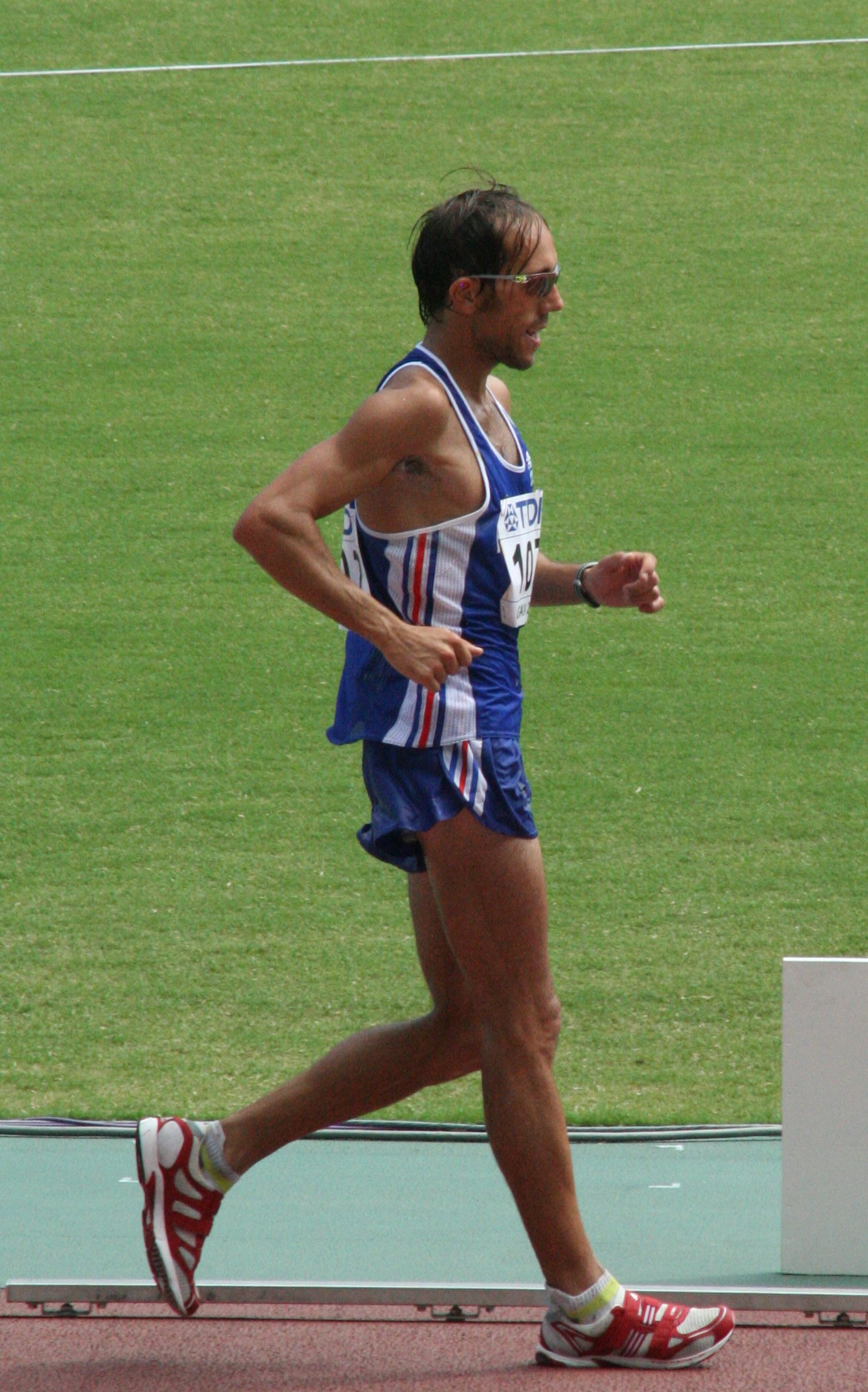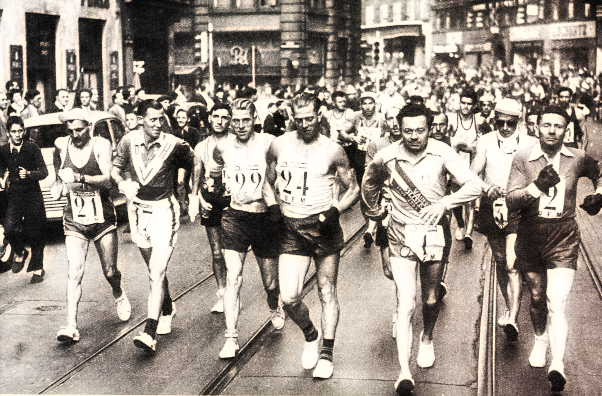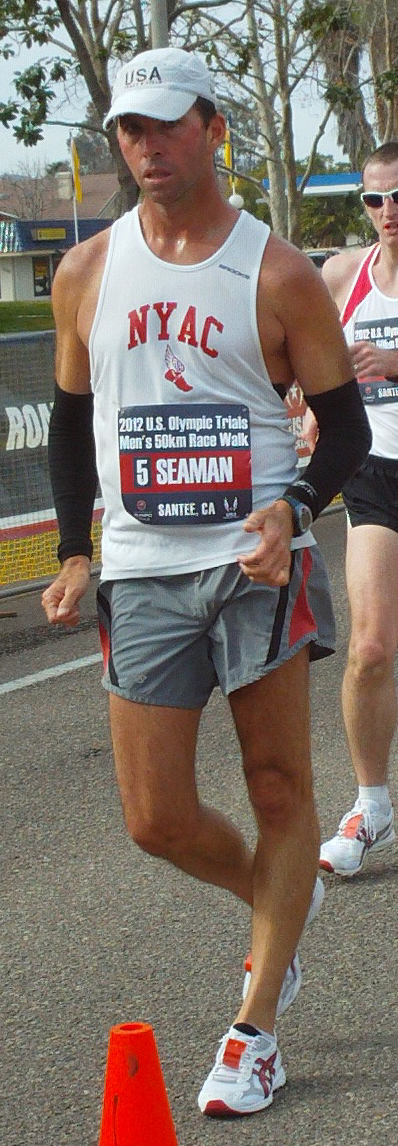|
Racewalking
Racewalking, or race walking, is a long-distance discipline within the sport of athletics. Although a foot race, it is different from running in that one foot must appear to be in contact with the ground at all times. Race judges carefully assess that this is maintained throughout the race. Typically held on either roads or running tracks, common distances range from up to 100 kilometres (62.1 mi). There are two racewalking distances contested at the Summer Olympics: the 20 kilometres race walk (men and women) and 50 kilometres race walk (men only). Both are held as road events. The biennial World Athletics Championships also featured these two events, in addition to a 50 km walk for women, until 2019. The 50km race walk was replaced by the 35 kilometres race walk as standard championship discipline in 2022. The IAAF World Race Walking Cup, first held in 1961, is a stand-alone global competition for the discipline and it has 10 kilometres race walks for junior ... [...More Info...] [...Related Items...] OR: [Wikipedia] [Google] [Baidu] |
Racewalker (legs Only) Not In Contact With The Ground
Racewalking, or race walking, is a long-distance discipline within the sport of athletics. Although a foot race, it is different from running in that one foot must appear to be in contact with the ground at all times. Race judges carefully assess that this is maintained throughout the race. Typically held on either roads or running tracks, common distances range from up to 100 kilometres (62.1 mi). There are two racewalking distances contested at the Summer Olympics: the 20 kilometres race walk (men and women) and 50 kilometres race walk (men only). Both are held as road events. The biennial World Athletics Championships also featured these two events, in addition to a 50 km walk for women, until 2019. The 50km race walk was replaced by the 35 kilometres race walk as standard championship discipline in 2022. The IAAF World Race Walking Cup, first held in 1961, is a stand-alone global competition for the discipline and it has 10 kilometres race walks for junior athlete ... [...More Info...] [...Related Items...] OR: [Wikipedia] [Google] [Baidu] |
Sport Of Athletics
Athletics is a group of sporting events that involves competitive running, jumping, throwing, and walking. The most common types of athletics competitions are track and field, road running, cross country running, and racewalking. The results of racing events are decided by finishing position (or time, where measured), while the jumps and throws are won by the athlete that achieves the highest or furthest measurement from a series of attempts. The simplicity of the competitions, and the lack of a need for expensive equipment, makes athletics one of the most common types of sports in the world. Athletics is mostly an individual sport, with the exception of relay races and competitions which combine athletes' performances for a team score, such as cross country. Organized athletics are traced back to the Ancient Olympic Games from 776 BC. The rules and format of the modern events in athletics were defined in Western Europe and North America in the 19th and early 20th century, a ... [...More Info...] [...Related Items...] OR: [Wikipedia] [Google] [Baidu] |
Pedestrianism
Pedestrianism was a 19th-century form of competitive walking, often professional and funded by wagering, from which the modern sport of racewalking developed. 18th- and early 19th-century Britain During the late eighteenth and nineteenth centuries, pedestrianism, like running or horse racing (equestrianism) was a popular spectator sport in Britain and Ireland. Pedestrianism became a fixture at fairs – much like horse racing – developing from wagers on footraces, rambling, and 17th-century footman wagering. Sources from the late 17th and early 18th century in England describe aristocrats pitting their carriage footmen, constrained to walk by the speed of their masters' carriages, against one another. The first notable exponent of this long-distance walking is generally considered to be Foster Powell (1734–93) who in 1773 walked from London to York and back, and in 1788 walked in 21 hours 35 minutes.Oxford Dictionary of National Biography, accessed 3 July 2016Arthur ... [...More Info...] [...Related Items...] OR: [Wikipedia] [Google] [Baidu] |
Walking
Walking (also known as ambulation) is one of the main gaits of terrestrial locomotion among legged animals. Walking is typically slower than running and other gaits. Walking is defined by an ' inverted pendulum' gait in which the body vaults over the stiff limb or limbs with each step. This applies regardless of the usable number of limbs—even arthropods, with six, eight, or more limbs, walk. Difference from running The word ''walk'' is descended from the Old English ''wealcan'' "to roll". In humans and other bipeds, walking is generally distinguished from running in that only one foot at a time leaves contact with the ground and there is a period of double-support. In contrast, running begins when both feet are off the ground with each step. This distinction has the status of a formal requirement in competitive walking events. For quadrupedal species, there are numerous gaits which may be termed walking or running, and distinctions based upon the presence or absenc ... [...More Info...] [...Related Items...] OR: [Wikipedia] [Google] [Baidu] |
2019 World Athletics Championships
The 2019 IAAF World Athletics Championships () was the seventeenth edition of the biennial, global athletics competition organised by the International Association of Athletics Federations (IAAF), since renamed World Athletics. It was held between 27 September and 6 October 2019 in Doha, Qatar, at the renovated multi-purpose Khalifa International Stadium, but reduced to 21,000 available seats. 1,772 athletes from 206 teams competed in 49 athletics events over the ten-day competition, comprising 24 events each for men and women, plus a mixed relay. There were 43 track and field events, 4 racewalking events, and 2 marathon road running events. The racewalking and marathon events were held in Doha Corniche. It was the first edition of the competition under its modified name, having previously been known as the World Championships in Athletics, and the last held before the IAAF assumed its new identity as World Athletics. It was also the first time the competition was in the Midd ... [...More Info...] [...Related Items...] OR: [Wikipedia] [Google] [Baidu] |
Jane Saville
Jane Kara Saville (born 5 November 1974) is an Australian race walker who won a bronze medal at the 2004 Summer Olympics in Athens. She was born in Sydney. Saville, from an athletically inclined family, competed in swimming, surf lifesaving, and walking as a junior athlete. She has competed at four Olympics, with a midfield result in 1996. In the 20 km racewalking event at the 2000 Summer Olympics in her home city of Sydney, when heading into the stadium's tunnel for the final stretch, Saville was disqualified for an illegal gait (''lifting'', a very common occurrence in race walking; the previous leader of the event had already been disqualified). Saville collapsed in tears. Afterwards, when asked what she needed, she replied: "A gun to shoot myself". Saville recovered her composure soon after and was publicly philosophical about her loss. On her bronze medal in Athens, Saville stated: "Nothing will make up for a gold medal in your home town, but you know this is where t ... [...More Info...] [...Related Items...] OR: [Wikipedia] [Google] [Baidu] |
100 Kilometres Race Walk
The 100-kilometer race walk is a racewalking event. The event is competed as a road race. Athletes must always keep in contact with the ground and the supporting leg must remain straight until the raised leg passes it. 100 kilometers is 62.14 miles. History Against the wishes of the Israeli track and field authorities, because the Munich Massacre had just taken place, Israel Shaul Ladany competed and won the gold medal in the World 100 km walking title at the 1972 World Championships in Switzerland, in a time of 9:31:00. U.S. record The United States record is 9:36:33, set by Dan Pierce in Houston, Texas Houston (; ) is the most populous city in Texas, the most populous city in the Southern United States, the fourth-most populous city in the United States, and the sixth-most populous city in North America, with a population of 2,304,580 i ..., on December 2, 1987. References {{Athletics events Racewalking distances ... [...More Info...] [...Related Items...] OR: [Wikipedia] [Google] [Baidu] |
50 Kilometres Race Walk
The 50 kilometre race walk was an Olympic athletics event that first appeared in 1932 and made its final Olympic appearance in 2021. The racewalking event is competed as a road race. Athletes must always keep in contact with the ground and the supporting leg must remain straight until the raised leg passes it. 50 kilometres is approximately 31 miles. The 50 kilometres race walk was dropped from the Olympic program after the 2020 Tokyo Games in 2021 and will be replaced by a mixed team race in order to achieve gender equality. World records The men's world record for the 50 km race walk was held by Denis Nizhegorodov, through his race of 3:34:14 in Cheboksary in 2008, until it was beaten by Yohann Diniz at the 2014 European Athletics Championships in Zurich, in a time of 3:32:33. All-time top 25 Men *Correct as of December 2021. Notes Below is a list of other times equal or superior to 3:38:17: *Yohann Diniz also walked 3:33:12 (2017), 3:37:43 (2019), 3:37:48 (2 ... [...More Info...] [...Related Items...] OR: [Wikipedia] [Google] [Baidu] |
Paris-Colmar
Paris-Colmar is an annual racewalking competition covering about 445 kilometers for men, and 300 kilometers for women and for men who participate for the first time. The competition began in 1926 as race from Strasbourg to Paris. The contest for women has been held since 1988. The race presently starts in Neuilly-sur-Marne (Seine-Saint-Denis) for the men and in Châlons-en-Champagne (Marne Marne can refer to: Places France *Marne (river), a tributary of the Seine *Marne (department), a département in northeastern France named after the river * La Marne, a commune in western France *Marne, a legislative constituency (France) Nether ...) for the women. They arrive in Colmar after more than 50 hours of racewalking. Special breaks are included to exchange food and clothing. In 2007, the prize for the winner in the men's contest 8,000 euros and 5,000 euros for women. The current participants are largely from Eastern Europe. A prospective contestant must qualify for the Paris-Col ... [...More Info...] [...Related Items...] OR: [Wikipedia] [Google] [Baidu] |
IAAF World Race Walking Cup
The World Athletics Race Walking Team Championships is a racewalking event organised by the International Association of Athletics Federations. It has been held since 1961, and generally on a biennial basis. Women first entered the 1979 edition. It was formerly known as the Lugano Cup after the city that hosted the first event, then became the IAAF World Race Walking Cup until 2016 and then IAAF World Race Walking Team Championships until 2018. In 2004, a junior division was added, consisting of men and women aged under 20. Since 2008 it has been a constituent meeting of the World Athletics Challenge – Race Walking. From 1975 to 1997 was awarded Lugano Trophy for combined team (20K + 50K). Since 1993 the medals have been awarded for the single events of the 20K and 50K teams, therefore in the 1993, 1995 and 1997 editions three team medals were assigned, from 1999 the combined was abolished and the team medals remained two until the present day. Host cities The 2016 Cup was d ... [...More Info...] [...Related Items...] OR: [Wikipedia] [Google] [Baidu] |
10 Kilometres Race Walk
The 10 kilometres race walk, or 10-kilometer racewalk, is a racewalking event. The event is competed as a road race. Athletes must always keep in contact with the ground and the supporting leg must remain straight until the raised leg passes it. 10 kilometers is 6.21 miles. History It was introduced at the 1912 Summer Olympics in Stockholm for men, and the 1992 Summer Olympics in Barcelona for women. It is no longer an Olympic event, having been changed to 20 km after 1952 for men and in 1999 for women, though it is still run in some international competitions. World records On May 28, 2000, Roman Rasskazov of Russia set a new 10-km race walk world record in Saransk in a time of 37:11. The all-time women's 10-km race-walk record is held by Yelena Nikolayeva of Russia, at 41:04. All-time top 25 Men *Correct as of 2 September 2018. Notes Below is a list of other times equal or superior to 38:30: * Francisco Javier Fernández also walked 38:01.4 (2001), 38:12 (200 ... [...More Info...] [...Related Items...] OR: [Wikipedia] [Google] [Baidu] |
50 Miles Race Walk
The 50-mile race walk is a racewalking event. The event is competed as a road race. See Kennedy march A Kennedy march is a long-distance march of , named after former American president John F. Kennedy. Origin John F. Kennedy came into office with a goal of improving the health of the nation as part of his New Frontier policy program. As Presi ... for the 50-mile walk started a fitness challenge. Athletes must always keep in contact with the ground and the supporting leg must remain straight until the raised leg passes it. 50 miles is 80.47 kilometers. U.S. records In 1966, Israeli Shaul Ladany broke United States record in the 50-mile walk, which had stood since 1878 and was at the time the oldest U.S. track record. World bests The men's world best for the 50-mile race walk is held by Ladany, through his race of 7:23:50 in 1972 in New Jersey, shattering the world mark that had stood since 1935. Notes References Racewalking distances {{athletics-stub ... [...More Info...] [...Related Items...] OR: [Wikipedia] [Google] [Baidu] |
_not_in_contact_with_the_ground.jpg)






